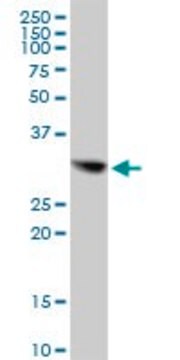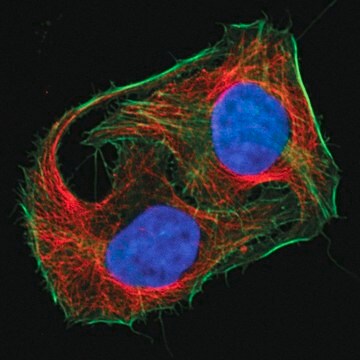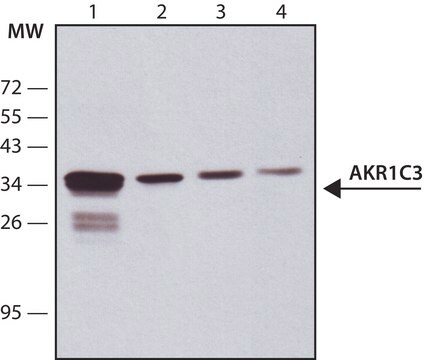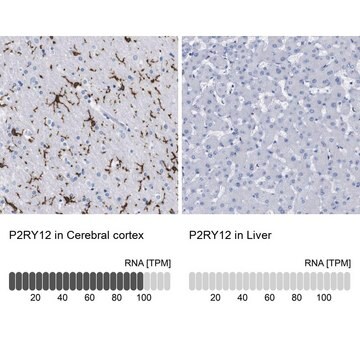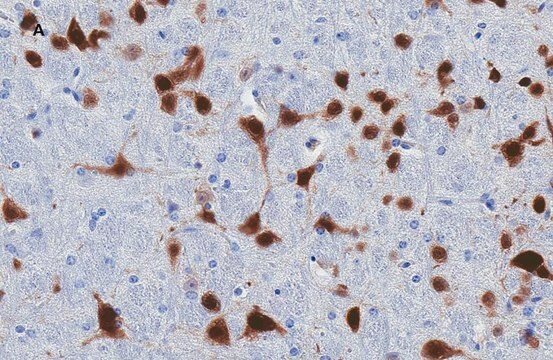HPA018433
Anti-CBR1 antibody produced in rabbit
affinity isolated antibody, buffered aqueous glycerol solution
别名:
Anti-15-Hydroxyprostaglandin dehydrogenase [NADP+], Anti-Carbonyl reductase [NADPH] 1, Anti-NADPH-dependent carbonyl reductase 1, Anti-Prostaglandin 9-ketoreductase, Anti-Prostaglandin-E(2) 9-reductase
登录查看公司和协议定价
所有图片(2)
About This Item
分類程式碼代碼:
12352203
人類蛋白質圖譜編號:
推荐产品
生物源
rabbit
品質等級
共軛
unconjugated
抗體表格
affinity isolated antibody
抗體產品種類
primary antibodies
無性繁殖
polyclonal
形狀
buffered aqueous glycerol solution
物種活性
human
技術
immunoblotting: 0.04-0.4 μg/mL
immunohistochemistry: 1:50-1:200
免疫原序列
TPFHIQAEVTMKTNFFGTRDVCTELLPLIKPQGRVVNVSSIMSVRALKSCSPELQQKFRSETITEEELVGLMNKFVE
UniProt登錄號
運輸包裝
wet ice
儲存溫度
−20°C
目標翻譯後修改
unmodified
基因資訊
human ... CBR1(873)
一般說明
The gene CBR1 (carbonyl reductase [NADPH] 1) is mapped to human chromosome 21q22.13. CBR1 is a ubiquitously-expressed protein. The protein localizes in the cytoplasm and is monomeric in nature. CBR1 is abundantly present in amnion epithelial, fibroblast cells and chorionic trophoblast cells.
免疫原
Carbonyl reductase [NADPH] 1 recombinant protein epitope signature tag (PrEST)
應用
All Prestige Antibodies Powered by Atlas Antibodies are developed and validated by the Human Protein Atlas (HPA) project and as a result, are supported by the most extensive characterization in the industry.
The Human Protein Atlas project can be subdivided into three efforts: Human Tissue Atlas, Cancer Atlas, and Human Cell Atlas. The antibodies that have been generated in support of the Tissue and Cancer Atlas projects have been tested by immunohistochemistry against hundreds of normal and disease tissues and through the recent efforts of the Human Cell Atlas project, many have been characterized by immunofluorescence to map the human proteome not only at the tissue level but now at the subcellular level. These images and the collection of this vast data set can be viewed on the Human Protein Atlas (HPA) site by clicking on the Image Gallery link. We also provide Prestige Antibodies® protocols and other useful information.
The Human Protein Atlas project can be subdivided into three efforts: Human Tissue Atlas, Cancer Atlas, and Human Cell Atlas. The antibodies that have been generated in support of the Tissue and Cancer Atlas projects have been tested by immunohistochemistry against hundreds of normal and disease tissues and through the recent efforts of the Human Cell Atlas project, many have been characterized by immunofluorescence to map the human proteome not only at the tissue level but now at the subcellular level. These images and the collection of this vast data set can be viewed on the Human Protein Atlas (HPA) site by clicking on the Image Gallery link. We also provide Prestige Antibodies® protocols and other useful information.
生化/生理作用
Carbonyl reductase [NADPH] 1 (CBR1) is an NADPH-dependent dehydrogenase/reductase and is responsible for the in vivo reduction of quinones, prostaglandins and other carbonyl-containing compounds including xenobiotics. In addition nitrogen-containing GSH adduct S-nitrosoglutathione (GSNO) is an efficient substrate of CBR1. CBR1 activity can be inhibited by various flavonoids including quercetin, rutin and semi-synthetic flavonoid monoHER (7-monohydroxyethylrutoside). Curcumin, a major component of the plant Curcuma longa, is a potent tight-binding inhibitor of CBR1. Absence of CBR1 promotes ovarian cancer growth and proliferation. CBR1 is responsible for conversion of cytotoxic daunorubicin to cardiotoxic daunorubicinol, thus reducing cytotoxicity of daunorubicin in primary acute myeloid leukemia cells. Glucocorticoid receptor binding to the CBR1 promoter stimulates CBR1 production in in human amnion fibroblasts. Presence of CBR1 converts prostaglandin E2 to prostaglandin F2α, which is involved in induction of human labor. NRF2 (Nuclear factor erythroid 2-related factor 2) is a transcriptional regulator of CBR1.
特點和優勢
Prestige Antibodies® are highly characterized and extensively validated antibodies with the added benefit of all available characterization data for each target being accessible via the Human Protein Atlas portal linked just below the product name at the top of this page. The uniqueness and low cross-reactivity of the Prestige Antibodies® to other proteins are due to a thorough selection of antigen regions, affinity purification, and stringent selection. Prestige antigen controls are available for every corresponding Prestige Antibody and can be found in the linkage section.
Every Prestige Antibody is tested in the following ways:
Every Prestige Antibody is tested in the following ways:
- IHC tissue array of 44 normal human tissues and 20 of the most common cancer type tissues.
- Protein array of 364 human recombinant protein fragments.
聯結
Corresponding Antigen APREST73872
外觀
Solution in phosphate-buffered saline, pH 7.2, containing 40% glycerol and 0.02% sodium azide
法律資訊
Prestige Antibodies is a registered trademark of Merck KGaA, Darmstadt, Germany
免責聲明
Unless otherwise stated in our catalog or other company documentation accompanying the product(s), our products are intended for research use only and are not to be used for any other purpose, which includes but is not limited to, unauthorized commercial uses, in vitro diagnostic uses, ex vivo or in vivo therapeutic uses or any type of consumption or application to humans or animals.
未找到合适的产品?
试试我们的产品选型工具.
儲存類別代碼
10 - Combustible liquids
水污染物質分類(WGK)
WGK 1
閃點(°F)
Not applicable
閃點(°C)
Not applicable
個人防護裝備
Eyeshields, Gloves, multi-purpose combination respirator cartridge (US)
Javier G Blanco et al.
Cancer, 112(12), 2789-2795 (2008-05-07)
Exposure to anthracyclines as part of cancer therapy has been associated with the development of congestive heart failure (CHF). The potential role of genetic risk factors in anthracycline-related CHF remains to be defined. Thus, in this study, the authors examined
Savitha Varatharajan et al.
European journal of clinical pharmacology, 68(12), 1577-1586 (2012-05-09)
The present study aimed to investigate the role of expression of daunorubicin-metabolizing enzymes carbonyl reductase 1 and 3 (CBR1 and CBR3) on the in vitro cytotoxicity of daunorubicin in primary acute myeloid leukemia (AML) cells and the effect of genetic
Raynard L Bateman et al.
The Journal of biological chemistry, 283(51), 35756-35762 (2008-10-02)
Human carbonyl reductase 1 (hCBR1) is an NADPH-dependent short chain dehydrogenase/reductase with broad substrate specificity and is thought to be responsible for the in vivo reduction of quinones, prostaglandins, and other carbonyl-containing compounds including xenobiotics. In addition, hCBR1 possesses a
Takeshi Miura et al.
Chemico-biological interactions, 202(1-3), 126-135 (2012-12-19)
Monomeric carbonyl reductase 1 (CBR1, SDR21C1) is a member of the short-chain dehydrogenase/reductase superfamily and is involved in the metabolism of anthracycline anti-cancer drugs, prostaglandins, and isatin, which is an endogenous inhibitor of monoamine oxidases. Additionally, cancer progression may be
Vanessa Gonzalez-Covarrubias et al.
Pharmaceutical research, 25(7), 1730-1734 (2008-05-02)
Carbonyl reductase 1 (CBR1) reduces the anticancer anthracyclines doxorubicin and daunorubicin into the cardiotoxic metabolites doxorubicinol and daunorubicinol. We evaluated whether the cardioprotectant monoHER inhibits the activity of polymorphic CBR1. We performed enzyme kinetic studies with monoHER, CBR1 (CBR1 V88
我们的科学家团队拥有各种研究领域经验,包括生命科学、材料科学、化学合成、色谱、分析及许多其他领域.
联系技术服务部门